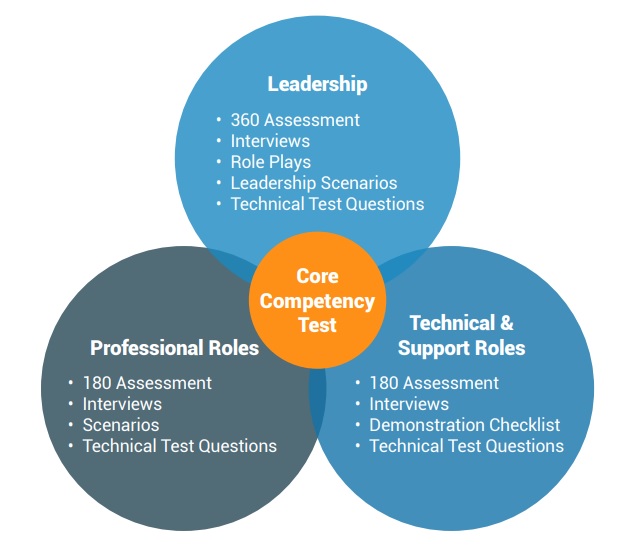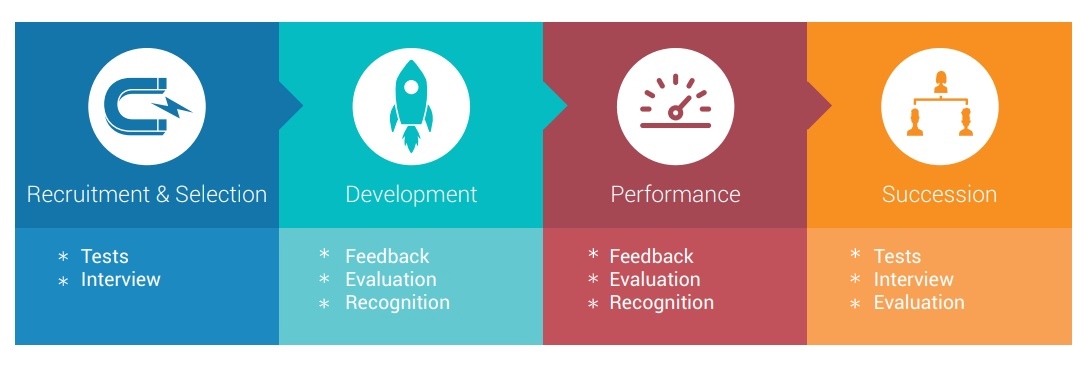HRSG Team
Our eBook demystifies the world of employee assessments and explains the basics about assessments.
In this eBook, learn more about:
- The key terminology differences between test, assessment and evaluation;
- The best types of assessment to use for different HR applications;
- The future of assessments and trends to keep an eye on.
Click to view this eBook as a PDF
(no sign-in required, right-click + save as to download)
Introduction
You’ve likely heard the words test, assessment, and evaluation used interchangeably, when in fact they each have different connotations and purpose in talent management. Quite simply, without assessments, there would be no basis for the most effective talent management programs.
Presently, the language surrounding these terms is both confusing and vague. It is difficult, if not impossible, to find any consistency regarding when and where each term is to be used correctly.
With this e-book, we aim to clarify the necessary terminology and provide an analysis of the benefits of implementing assessments in the workplace.
What is an Assessment?
An assessment refers to any tool that is used to measure an individual's knowledge, skill, aptitude, or competence.
It can include tests, exams, simulations, on-the-job observations, interview questions, or even games.
What assessments have in common is that they are based on clear job requirements and produce consistent and reliable results, therefore positioning them as accurate predictors of overall job success.
The Importance of Context and Employee Assessments
Understanding and recognizing the differences between assessment tools is essential to best leveraging their power.
As an example, if you are looking to quickly and effectively pre-screen many candidates, it would be wise to first develop a test with closed-ended questions that is administered online. This cost effective and easy method allows you to filter out those candidates that do not meet
minimum job requirements.
However, if you are looking to promote a small number of people into management positions, try developing a simulation exercise or conduct a behavior-based interview. This more in-depth method examines how people have behaved in past situations to more clearly determine their levels of competence.
Equally as integral as understanding and recognizing the differences between assessment tools is understanding the target audience for the assessment. There are a variety of types of assessments that are suited to different organizational roles.
 *Infographic about job roles and employee assessments
*Infographic about job roles and employee assessments
The infographic above details how understanding the context in which you are performing an assessment allows you to choose the best assessment tool to implement.
Whether you’re conducting an organization-wide assessment with core competencies, or assessing specific professional, leadership, or technical roles, there is an assessment tool that categorically suits your needs.
Types of Employee Assessments and Their Definitions
- Test
- Definition: A test is a type of assessment used to reliably assess competencies against a pre-defined standard. Tests typically have questions with a right or wrong response such as multiple choice, true/false, matching, etc.
- Examination
- Definition: An examination is considered ‘high-stakes’, in that the consequences of passing or
failing significantly impacts the individual.
- Definition: An examination is considered ‘high-stakes’, in that the consequences of passing or
- Structured Interview
- Definition: Questions are asked by the interviewer to obtain information about competencies. Structured interviews are carefully developed, standardized, and evaluated based upon job criteria.
- Evaluation & Feedback
- Definition: An approach that examines an individual’s performance or competencies as compared against a standard.The individual concerned can score him/herself by way of a rating scale. This information provides employers with the ability to monitor and measure performance and to provide meaningful feedback to employees.
- Recognition
- Definition: Acknowledgement of an individual or team’s behavior, efforts, and accomplishments.
Employee Assessments Across the Talent Lifecycle
In today’s corporate world, the role of assessment can vary as an employee progresses through the talent lifecycle. During the recruitment and selection phase a test might be used as a screening tool prior to an interview.
These tests typically adopt closed-ended multiple choice questions, well suited for high volume and easy scoring and aligned with competencies core to the organization and jobs. As employees progress throughout their careers, they might be presented with simulations, case studies or knowledge tests, tailored to their competency development needs.

*Infographic about the talent lifecycle and employee assessments
Should an employee be considered for management or leadership, the assessment may then become even more situation specific and involve higher order thinking skills such as judgement, critical thinking or business acumen.
Want to learn more about competency assessments?
Fill out the form below to access our Testing & Assessment Toolkit today!
*This toolkit collection includes our introductory guide, "Assessment 101"; real-world case studies and webinar examples; and additional blog insights and video content.
Post last updated: August 7, 2020.

Submit a Comment